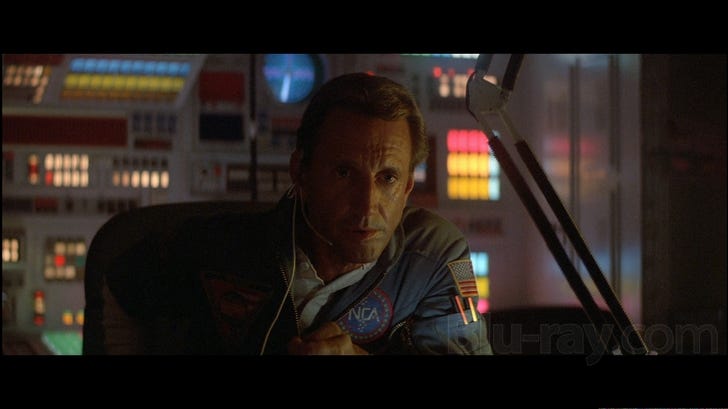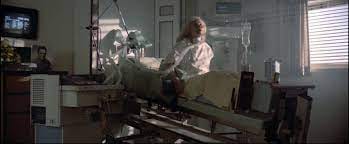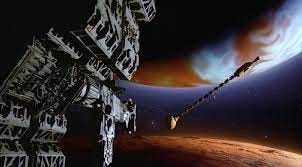The grounded realism of 2010: The year we make contact
Underrated sci-fi gem
“My God, it’s full of stars!” - Dave Bowman.
What makes this film stand out as one of the best (perhaps underrated) sci-fi films of the 80’s?
The visuals.
That used cassette futurism. Cramped, lived in. It’s one of the things that makes the film stand out. Particularly when you compare it to the clean, minimalism of the original.
In what is now an alternative future to us, (on the film’s release…just the future!), 2010 looks like it took its design cues from Ridley Scott’s Alien. And it feels more grounded as a result.
The characters have real conversations, not about science, but about the best hotdogs and missing home (played brilliantly between the incomparable Roy Scheider and John Lithgow). Yes, they’re scientists and engineers, but without the stilted and formal professionalism of Poole and Bowman.
Some of the best visual moments actually take place on Earth, where 80’s futurism, mixed with a little synth music, gives the film a sinister/surreal feel similar to Michael Mann’s Manhunter (1986) and even William Peter Blatty’s 1990 horror classic, Exorcist 3.
All of this allows the viewer to enter this world, dealing with heady themes such as highly advanced alien life, interstellar reincarnation, AI, turning planets into suns etc, with absolute believability.
Not for a second do you ever question the logic and reality you’re observing, and like all great films (IMO), you can imagine being part of the crew and trying to navigate the moral dilemmas the story throws at you - as well as tasting the smoke and nicotine of the chain-smoking crew!
The SFX for the scenes set in space are also incredible - where many filmmakers from the time may have settled for dated, cheap-looking visuals - with 2010, Peter Hyams really brings the Jovian system to life, with convincing planet images, realistic space vistas and an oxidised surface of the Discovery adding even more battered realism to the movie - it really feels as if they are entering a shipwreck left adrift for nearly a decade. And from the first time you see it spinning in orbit, you feel as if you’re face to face with the most important and haunting character of the saga.
If 2001 ever left you confused, 2010 will answer many of the questions in an intelligent, artistic way. It’ll show you a different HAL9000 and give you a new perspective on the Discovery One disaster.
Many will argue that it comes nowhere near to the original, and while that’s up for debate, it’s certainly not as seminal as 2001: A Space Odyssey. But 2010, rounds off the film series, with an unforgettable cast, great dialogue, ahead-of-their-time visuals and a haunting sense of discovery about what went wrong on the first mission along with the further exploration of our place in the universe and how little we truly understand.
An unforgettable film.




